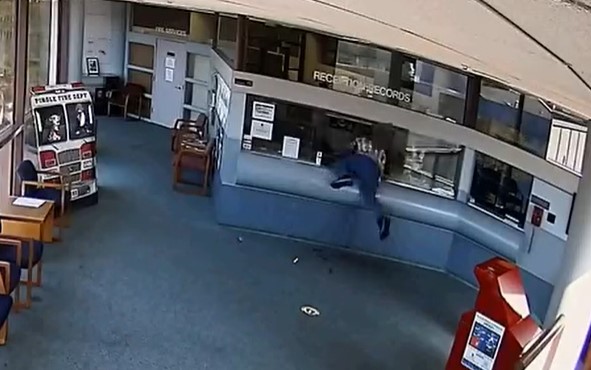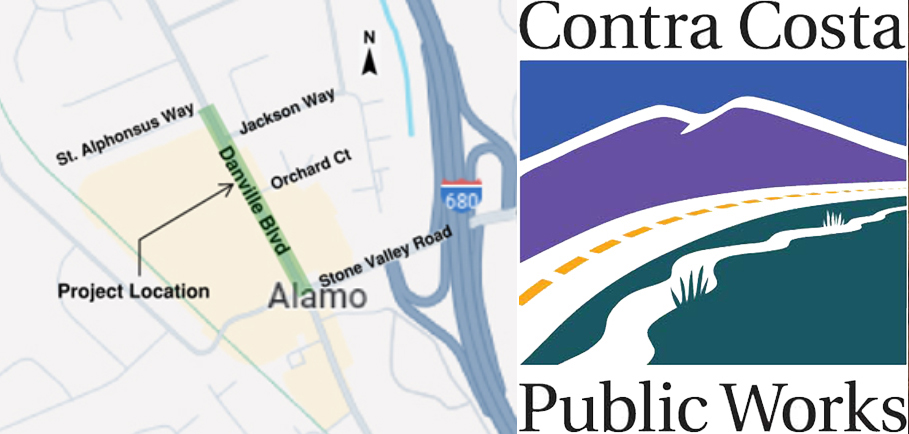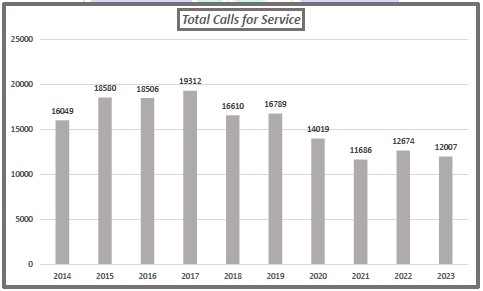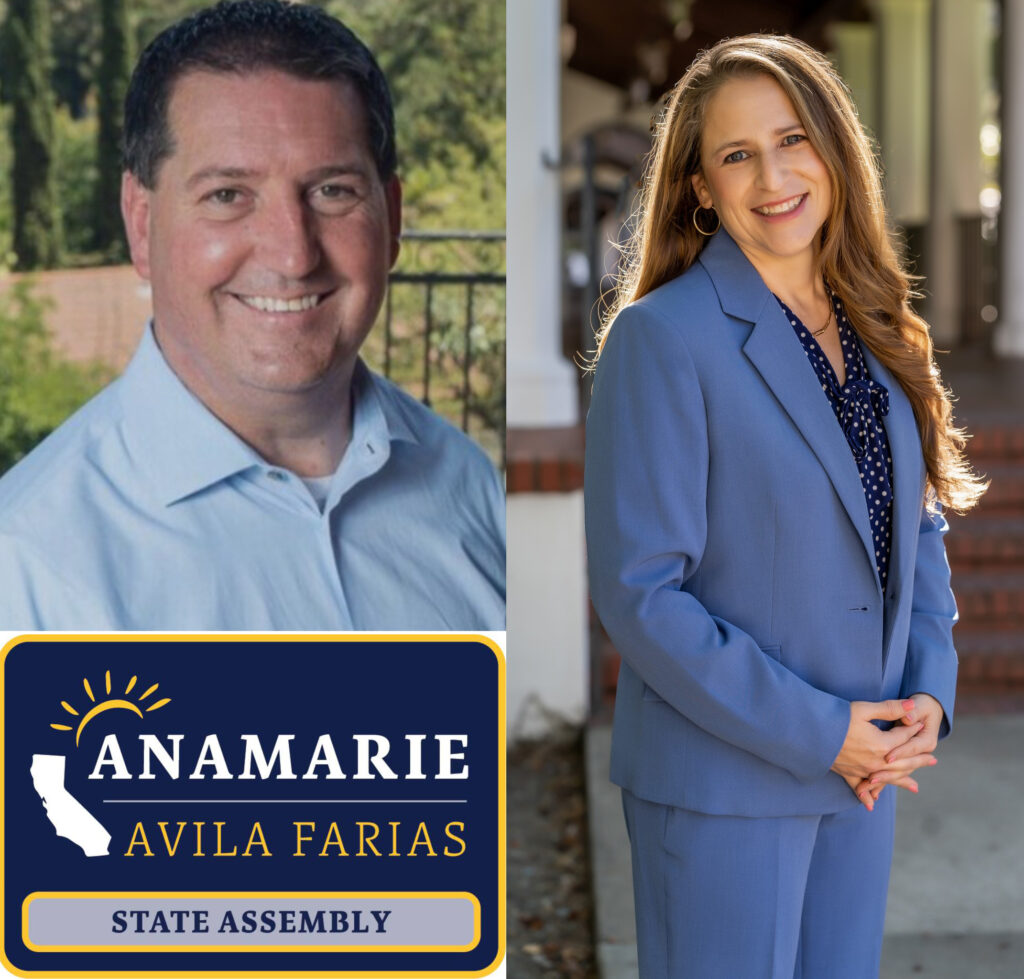Expect up to 15-minute traffic delays
Part of the Danville Boulevard/Orchard Court Complete Streets Improvement Project
By Kelly Kalfsbeek, Community & Media Relations Coordinator, PIO, Contra Costa County Public Works
Alamo, CA – Contra Costa County Public Works will perform surface treatment work as part of the Alamo Roundabout Project starting Thursday, June 20, 2024, through Wednesday, July 17, 2024, weather permitting. Message Boards will be posted in advance to advise of the scheduled work. Drivers should expect delays of up to 15 minutes near the area of work. Work consists of applying a pavement surface treatment and final roadway striping along Danville Blvd. from Stone Valley Road to St. Alphonsus Way.
Thursday, June 20, 2024, through Friday, June 28, 2024, 8:00 pm to 6:00 am: Night-time work will include pavement surface treatment work. One-way traffic control will be implemented, and flaggers will be present.
Monday, July 8, 2024, through Wednesday, July 17, 2024, 8:00 pm to 6:00 am: Night-time work will take place for roadway striping operations. One-way traffic control will be implemented, and flaggers will be present.
The Danville Boulevard/Orchard Court Complete Streets Improvement Project-Alamo Roundabout Project will improve safety of vehicles, bicycle, and pedestrian traffic along Danville Boulevard. The project will construct sidewalks and bicycle facilities, improve landscaping and electrical work, reconstruct pavement, apply a pavement surface treatment, replace traffic striping and pavement markings, and install curb extensions and ramps along this segment of Danville Boulevard. It will also create a roundabout at the intersection of Danville Boulevard and Orchard Court. Funding for this project is provided by the federal Highway Safety Improvement Program grant, Measure J Regional Funds, and Gas Tax Funds. For more project information about this project visit: www.contracosta.ca.gov/alamoroundabout.
About Contra Costa County Public Works Department:
Contra Costa County Public Works Department (CCCPWD) maintains over 660 miles of roads, 150 miles of streams, channels, and other drainage and over 150 County buildings throughout Contra Costa County. CCCPWD provides services such as Parks and Recreation, Sandbag Distribution and Flood Control throughout unincorporated areas of Contra Costa County. CCCPWD operates two airports, Buchanan Field Airport in Concord, and Byron Airport in Byron. For more information about CCCPWD, please visit us at www.cccpublicworks.org.
Read More“Overall, crime remains low in Lafayette, a testament to the collective efforts of our community. However, there are still categories of crimes that the Police Department, in partnership with our residents, continues to strive to reduce.” – Chief Benjamin Alldritt
By Lafayette Police Department
The most recent crime report for 2023 from the Lafayette Police Department has been presented to the Lafayette City Council. The report shows that the rate of violent crime in Lafayette remains low, with only 13 reported Part 1 violent crimes in 2023. This equals 51.2 violent crimes per 100,000 people, compared to the national average of 380.7 violent crimes per 100,000 and the California average of 494.6 violent crimes per 100,000 in 2022.
“Overall, crime remains low in Lafayette, a testament to the collective efforts of our community. However, there are still categories of crimes that the Police Department, in partnership with our residents, continues to strive to reduce,” said Lafayette Police Chief Benjamin Alldritt.
In 2023, the Lafayette Police received 12,007 calls for service, filed 1,168 police reports, made 302 arrests, and issued 1,022 traffic citations.
Part I Crimes include two categories: Crimes against Persons and property crimes. Crimes against Persons are murder, rape, aggravated assault, robbery, and human trafficking. Property Crimes are burglary, larceny, motor vehicle theft, and arson.
“Crimes against Persons are our top priority because they have the most significant impact on the victim. The Lafayette Police Department is committed to dedicating all necessary resources to investigate these crimes and bring the suspects to justice,” said Chief Alldritt.
Overall, Part 1 crimes decreased from 456 in 2013 to 277 in 2023. This represents a 39% decrease in these types of crime over the last decade.
“Proactive policing and an alert community keep crime low in Lafayette,” he continued. “If people see something, they say something. Residents quickly report, respond, and actively watch out for their friends, family, and neighbors. We appreciate that our community members continue to call in and report crimes and remain aware of their surroundings”.
“The professional staff are force multipliers for the Police Department,” said Chief Alldritt. “They run the administrative office, manage the City’s emergency preparedness activities and fleet maintenance, carry out crime scene investigations, parking enforcement, vacation house checks, emergency traffic control, and other programs such as “Slow Down Lafayette.”
The City of Lafayette takes a multi-departmental approach to reduce accidents in Lafayette by using the “Three E’s” of traffic safety: Enforcement, Engineering, and Education. The Police Traffic Unit meets regularly with the City’s Transportation Planner to identify problem areas where engineering solutions may have a calming effect on traffic, resulting in fewer accidents and less need for enforcement. The Traffic Unit reviews collision rates and locations, along with citizen complaints, when considering areas for enforcement efforts.
- Acquired two low-profile radar measurement devices, two temporary speed display signs, two speed display trailers, and two LIDAR devices to assist with speed enforcement.
- Analyzed over 1.3 million data points on vehicle speeds
- Reduced the number of speeders by 20%–25% in areas where display signs and traffic enforcement are used.
 Provided educational materials on crosswalk safety, school bus safety, e-bikes, and various weather and other traffic-related notices.
Provided educational materials on crosswalk safety, school bus safety, e-bikes, and various weather and other traffic-related notices.
- The Lamorinda Residents Guide to Wildfire Preparedness and Evacuation was updated and mailed out to all Lamorinda residents in 2022.
- The Police Department encouragesresidents to sign up for the County’s Community Warning System (CWS)
- The ALERT California wildfire program maintains a network of cameras to detect, alert, and monitor wildfires. Lafayette Police Department Emergency Services Manager John Cornell handled the installation of multiple wildfire cameras throughout Contra Costa County, which included training for multiple local fire and police departments.

Lafayette Police Department Emergency Services Manager John Cornell handled the installation of multiple wildfire cameras and coordinated camera locations and training with other agencies. Source: Lafayette PD
The city also operates an information and emergency radio station, available on AM 1670 or streaming via the city’s app, My Lafayette, for free on the Apple App Store and Google Play – Android Store.
“I am proud of the men and women who serve the City of Lafayette with pride and dedication,” says Chief Alldritt. “The entire Police Department and our City staff and leaders are focused on providing the highest level of service possible to our residents, businesses, and visitors. From responding to calls for service, to investigations, traffic enforcement, emergency preparedness, and the myriad other things my staff do daily in service of the community.”
You can also download the slide deck of the May 28, 2024, presentation and watch a recording of the presentation to the City Council on May 28, 2024, on the City’s YouTube channel.
Lafayette is a charming small community located in Contra Costa County, 30 miles from The City of Oakland. It’s known for its beautiful green hills, excellent schools, and miles of hiking trails, making it an attractive place to live. The City has a population of more than 25,000 highly educated residents, with 75.2% of them holding a bachelor’s degree or higher. Additionally, 73.6% of the homes in Lafayette are owner-occupied. The median home value is $1,914,700, while the median household income is $219,250. The total area of the city is 15.22 square miles.
Read MoreDistrict seeks to highlight exemplary young alumni
By Ilana Israel Samuels, Director of Communications, Family and Community Engagement, San Ramon Unified School District
The San Ramon Unified School District, in partnership with the San Ramon Valley Education Foundation, is pleased to announce the second annual 30 Under 30 Alumni Recognition Campaign. Nominations are now open to highlight SRVUSD graduates who are 30 years old or younger and have made a positive impact in our community and beyond.
The 30 Under 30 Alumni Recognition Program will recognize SRVUSD alumni who:
- Graduated from a school or program in SRVUSD
- Are currently 30 years old or younger (in 2024)
- Are thriving in their endeavors since graduating from SRVUSD in one or more of the following ways:
- They have made a significant impact on or contribution to the San Ramon Valley community; and/or
- They have achieved their college and/or career goals; and/or
- They have accomplished something else significant or impactful along their pathway since graduating.
Anyone can nominate alumni by filling out the 30 Under 30 application and submitting it by August 19, 2024. The winners will be announced in fall 2024, and honored and celebrated in a variety of ways. Winners from the 30 Under 30 honorees in 2023 can be viewed on the district’s 30 Under 30 web page and in the video.
Any questions from the community can be sent to communications@srvusd.net.
About San Ramon Valley Unified School District: Located in the San Francisco Bay Area, San Ramon Valley Unified School District (SRVUSD) is one of the highest-achieving school districts in California. With approximately 29,000 students, the district encompasses the communities of Alamo, Danville, San Ramon, and a small portion of Walnut Creek and Pleasanton.
SRVUSD has been recognized at state and national levels with many awards and achievements. The district is designated by AASA, The School Superintendents Association, as a Learning 2025 Lighthouse District because it serves as a model of positive change in public education and is committed to the whole child. Based on a foundation of academic excellence, SRVUSD’s work is guided by the district’s Strategic Directions, and broadening the definition of success so all students can thrive. The district maintains graduation rates above 96%. The Learner Profile outlines the competencies the district aspires for students to possess upon graduation, preparing students to be Critical Thinkers, Creative Contributors, Intentional Collaborators, Adaptable Learners, and Effective Communicators.
About the San Ramon Valley Education Foundation (SRVEF): The San Ramon Valley Education Foundation invests in education, supports parent organizations, and engages our community for the benefit of and in partnership with SRVUSD. The vision of the Major Gifts and Endowment Fund of the SRVEF is to provide a stable, local funding source that will enable the San Ramon Valley Unified School District to undertake long term and innovative educational programs to enhance the curriculum. Over the past years distributions from the Endowment Fund have helped fund significant programs that directly impact SRVUSD students. Learn more at www.srvef.org.
Ilana Israel Samuels
She/Her/Hers
Director of Communications, Family and Community Engagement
Read More

Pinole Police building video shows Victor jumping over the counter and into the offices of the clerk. Screenshot source: Pinole PD
By Commander Matt Avery, Pinole Police Department
On Tuesday, June 11, 2024, at approximately 4:15 PM, a male subject entered the Pinole Public Safety Building (880 Tennent Avenue, Pinole) and walked around the reception area while a police employee assisted a citizen at the front counter. The subject used the drinking fountain and then attempted to open the locked lobby door leading to the police department’s inner office area. The subject then sat down and waited approximately two minutes until our staff member finished assisting the citizen.
When the citizen completed her business and left the area, the male subject approached the front counter, where our staff member greeted him. The subject responded by reaching out and ringing the counter bell several times. Within seconds, the subject grabbed our staff member by her right arm. The victim fought back, and the subject pulled her toward him, preventing her from escaping. The victim could break free from the subject’s grasp, and the subject climbed over the counter and through a window. The victim retreated into the main hallway, and the subject chased after her. The victim was able to enter the administrative office area with the assistance of another staff member. Officers in the department at the time heard the disturbance and quickly made their way toward the reception area. They confronted the subject in the main hallway and safely detained the subject. (See Facebook incident video)
The victim sustained minor injuries to her right arm caused by the subject when he grabbed and pulled her. The victim is expected to make a full recovery. The subject was arrested and identified as Chester Erwin Victor, Jr. (born 4/20/1959), a 65-year-old male from unincorporated San Pablo. He was booked at the Martinez Detention Facility on burglary (PC 460(b)), kidnapping (PC 207(A)), false imprisonment (PC 236), battery (PC 243(A), assault (PC 241(A)), and a warrant.
This is an ongoing investigation, and anyone with information is urged to contact the Pinole Police Department Criminal Investigation Division at 510-724-1111.
According to localcrimenews.com, Victor was also arrested by Solano CHP in June 2017 for DUI.
According to the Contra Costa County Sheriff, he is five-feet, 11-inches tall, 200-pounds, Hispanic and being held in the Martinez Detention Facility on $47,500 bail and his next court appearance is scheduled for June 26 is Superior Court.
Allen D. Payton contributed to this report.
Read MoreDeadline: July 1
By Kensington Police Department
National Night Out is Tuesday, August 6th, 2024. If you’re interested in hosting a National Night Out Block Party on Tuesday, August 6th, please complete the host registration form. The host Registration Deadline is 5:00 pm July 1st. Please visit Kensington National Night Out 2024 to register: www.kensingtonfire.org/nationalnightout
Read MoreBy Hercules Police Department
Experience the Thrill of Real-Life Scenarios: Enroll in the Youth Police Academy Today! Get hands-on with live demonstrations and learn practical skills tailored specifically for youth. From navigating social media safety to understanding the law, our academy equips you with the knowledge and tools you need to succeed.
Plus, explore exciting career opportunities and bolster your college applications with this unique experience. Don’t miss out on this chance to connect with the humans behind the badge and ignite your passion for serving your community.
Sign up now and step into your future with confidence! To register click, here.
Read More
The gun, magazine and drugs confiscated from the known felon on Wednesday, June 12, 2024. Photo: San Pablo PD
Officers in Action
By San Pablo Police Department
Wednesday night, June 12, 2024, Officer Troche was patrolling the city when he made a traffic stop on a vehicle whose driver is a known felon from previous contacts. The driver was found to have an outstanding warrant. Inside the vehicle Officer Troche located a loaded firearm along with a large amount of drugs.
The driver of the vehicle was booked into county jail on the warrant and felony charges.
That makes one more gun taken out of the hands of a convicted felon. Thanks Officer Troche!
Read More
The Lamorinda Safety Fair will be held Saturday, June 22, 2024, from 9:00am-4:00pm at the Lafayette Reservoir off Mt. Diablo Blvd. presented by Lafayette Police, East Bay Municipal Utilities District, Amateur Radio Communications and Lafayette CERT Foundation.
Meet your local first responders and see their equipment. Get up close to a police helicopter. Learn how to perform CPR. Learn how to use a fire extinguisher. Learn how to prepare for the next emergency / disaster. Meet your local HAM radio club (LARIG) and talk to HAM operators from around the globe using radio!
Shuttle service and additional parking will be available at the Lafayette Veteran’s Memorial Building at 3780 Mt. Diablo Blvd. For more information call (925) 299-3282.
Read MoreMARTINEZ, CA—State Assembly candidate Anamarie Avila Farias announced, Thursday, June 13, 2024, the endorsement of Contra Costa Assemblyman Tim Grayson for her campaign to represent Northern Contra Costa County in the State Legislature.
“Anamarie’s experience in our local communities, especially her service on the Martinez City Council and Contra Costa County Board of Education, has prepared her to be an effective voice for us in the Legislature,” said Assemblymember Grayson. “I’m looking forward to partnering with her as we fight for Contra Costa’s share of state resources and policies that help working families get ahead.”
“Tim Grayson’s a voice of reason and purpose in the Legislature,” said Anamarie. “I’ll bring a similar attitude to making state policies: Results over rhetoric, progress over politics.
“I really appreciate Assemblymember Grayson’s support and look forward to working with him.”
Avila Farias was the second-place finisher in the March Primary election but the top vote-getter in the field of three Democrats and faces off against the Republican candidate in November’s election. Democratic voters outnumber Republicans 52%-19% in District 15’s registration numbers. If elected, she would be the first Latina to serve Contra Costa in the State Legislature.
She has an extensive record serving her community and setting state policy. She currently serves as a Trustee of the Contra Costa County Board of Education and has consistently pushed for improved public education in Contra Costa schools. She also served on the Martinez City Council from 2012-2016.
Avila Farias is running to represent California State Assembly District 15. The district encompasses Martinez, Pleasant Hill, Concord, Clayton, Pittsburg, Bay Point, Antioch, Crockett portions of Brentwood and unincorporated areas of Contra Costa County.
To learn more about her campaign, visit anamarie4assembly.com.
Read More
Damage caused to a Pittsburg business, the suspect’s car caught on surveillance camera video and pellet guns confiscated by police. Photos: Pittsburg PD
Eight felony counts
By Pittsburg Police Department
Over the past few months, a series of vandalisms targeted multiple businesses on Garcia Avenue in Pittsburg. The vandals used a pellet gun to shoot at the glass windows of these establishments, resulting in significant financial losses amounting to thousands of dollars.
In response to these incidents, the property owner took proactive measures by installing surveillance cameras. These cameras successfully captured footage of the culprit in action, providing a vital lead for the investigative efforts of Detective Lefterov. Through diligent work spanning several weeks, Detective Lefterov gathered substantial evidence and successfully identified the individual responsible for the vandalism.
Subsequently, several search warrants were issued and executed, leading to the confiscation of a BB gun, an air rifle, numerous copper BBs, and suspected illicit substances. The suspect was apprehended and charged with eight counts of felony vandalism.
Read More























